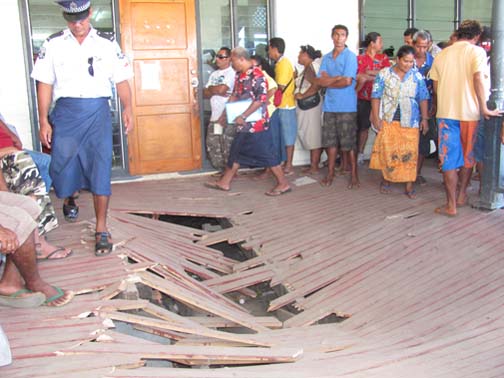
Aiga Vaisuai
APIA: “There was a crackling sound, then a big bang, then screaming as people fell through the cracked floor and piled on each other.”
This is how Esmay Finau described the collapse of a wooden floor in Samoa’s Electoral Office at Mulinu’u in Apia when it split open under the weight of about 200 voters.
The voters were pushing their way to be registered before the 5pm deadline yesterday afternoon for the general election due on March 4.
The wooden floor is at the office entrance and voters were forced to squeeze through a wooden door which was closed. Disorganised voters pushed their way inside to try to get registered before the deadline.
Eyewitnesses say the floor started caving in after 10 am. Others, who were mainly at the back, started rocking the floor until it broke and people fell through the gaps.
A policeman told Talamua that he tried to establish a system by asking people to form two lines from the entrance to the closed doors, but not many people took notice.
Nanai Kalolo, a voter registering from New Zealand, was almost to the front of the line when the floor gave in. He found himself being pulled free by another voter.
Kalolo told Talamua that they were yelling to the people at the back to move to make it easier to free those caught under.
‘Like brick wall’
“But it was like talking to a brick wall,” he said.
But no one was injured.
Kalolo was surprised at the reaction of the people.
“They did not care, they just wanted to get inside the office.”
He suggested that the registration should have been conducted at the new courthouse.
The Electoral Office is located at the old Lands and Title Court offices – an old wooden building.
Kalolo said the building was “unhealthy” and the people did not help lessen the danger. Instead, they made it worse by “pushing and jumping up and down and caused more wooden planks to break”.
‘Heartlessness’
A young woman from Lepea trapped under the weight of others said: “I am surprised at the heartlessness of the people.
“It seems the only thing people cared about was getting registered,” she said.
Others blamed the office for not having being able to organise a proper system in order to control the expected crowd and get them registered.
“It’s a mess here,” said Tuialamu Mosese from Lotofaga.
“The Electoral Office should have learnt from past experiences where the faced the same problem. There should have been a proper system for voters to be registered.”
Observers said the current system is time consuming and too hard.
New voters have to fill in a form then wait to be called out by the office staff. This takes a long time to look for the new voter and just as long to get through the lines as the others waiting for their turn refuse to budge.
Registration moved
After the incident, registration shifted to the old Lands and Titles Court and there was more pushing as long queues waited in the sun to get inside to be registered in a computerised system with their photos and fingerprints being taken.
Last minute registration of voters has always been a problem. In the past, registration went throughout the night until the next morning.
Groups of voters from outlying villages said they arrived at 5am and started lining up but the office just opened after 8am.
The Electoral Commissioner, Tanuvasa Isitolo Lemisio, was not available for comment.
Aiga Vaisuai is a Diploma Journalism student at the National University of Samoa and is doing a five-week internship with Talamua Media. This story has been republished with permission from Talamua.
Electoral office floor broke under voters' weight



